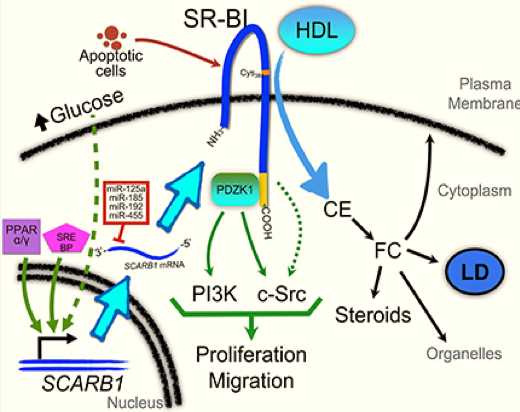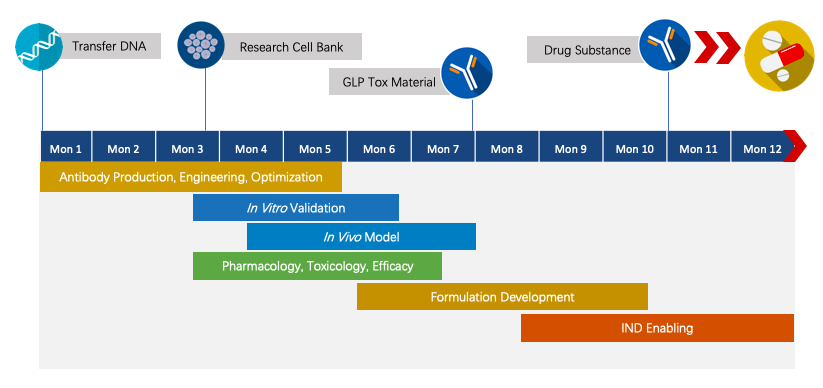About This Program
This program aims to develop anti-SR-B1 therapeutic monoclonal antibody for immuno-oncology.
Rationality when developing the program:
-
The primary function of SR-B1 is to regulate cholesterol and lipoprotein metabolism in cancer progression.
-
Scavenger Receptor Class B Type I (SR-BI) is a high density lipoprotein (HDL) that is overexpressed in a various range of cancers, including nasopharyngeal, prostate, breast, colorectal, pancreatic, ovarian and adrenocortical. It often acts as an oncogene.
-
SR-B1 effects programmed cell death, female fertility, platelet function, vasculature inflammation, diet-induced atherosclerosis, and myocardial infarction.
-
High SR-B1 expression is associated with tumor aggressiveness and poor clinical outcomes in breast and prostate cancers.
-
SR-B1 has also been identified as a potential marker for cancer diagnosis and prognosis.
Given the fact that lipid metabolism is a biological process closely related to the cancer progression, SR-B1 as one of the “bad” lipoprotein may be a potential target for cancer immunotherapy.
SR-B1
Scavenger receptor class B type I (SR-BI), also known as SCARB1 or CLA-1 (CD-36 and LIMPII are similar 1), is a membrane protein with a molecular weight of 82 kDa. It acts as a major HDL receptor that regulates the uptake of HDL-derived cholesterol and cholesterol esters in liver and steroid tissues.
Highlighted Functions:
-
Liver SR-BI is involved in regulating the reverse cholesterol transport pathway, which promotes the removal and excretion of excess cholesterol in the body.
-
In the context of atherosclerosis, SR-BI joins the regulation of intracellular signaling, lipid accumulation, foam cell formation, and apoptosis.
-
For breast tumor models, the SR-B1 receptor is the key interchange for tumor cells to uptake and accumulate cholesterol.
-
Recent research puts the focus on examining the role of SR-BI in lipid metabolism in cancer therapy.
 Fig.1 Role of SR-BI in the regulation of cellular signaling pathways and regulation of its expression in cancer cells.1
Fig.1 Role of SR-BI in the regulation of cellular signaling pathways and regulation of its expression in cancer cells.1
SR-B1 in Cancer Studies
Here are some published data about SR-B1 working as a potential target for cancer immunotherapy.
-
SR-B1 expression was significantly associated with overall survival in lung cancer (left), RCC (middle), and gastric cancer (right).
 Fig.2 Kaplan–Meier curves of the association between SR-B1 expression and the patients’ overall survival in lung cancer, RCC, and gastric cancer.2,3
Fig.2 Kaplan–Meier curves of the association between SR-B1 expression and the patients’ overall survival in lung cancer, RCC, and gastric cancer.2,3
Ongoing Clinical Trials
-
Currently, to the best of our knowledge, NO anti-SR-B1 therapeutic monoclonal antibodies are being evaluated in clinical trials.
-
Despite this, SR-B1 is still a compelling target for cancer immunotherapy. In an effort to optimally leverage SR-B1-mediated immune response, the next generation of SR-B1 targeting treatment attempts to explore combination therapy trials with other immunomodulatory agents.
Program Planning and Management
We have extensive knowledge of end-to-end program development. For each program, we are committed to delivering the final complete program to our clients within 1.5 years before entering the IND stage.
 Fig.3 Project pipeline management of therapeutic monoclonal antibody.
Fig.3 Project pipeline management of therapeutic monoclonal antibody.
Cooperation
Creative Biolabs is looking for potential partners (include but not limit to major pharma or biotech firms) to develop anti-SR-B1 therapeutic monoclonal antibody program together. Our scientists are dedicated to bringing years of valuable experience to our partner and achieve a meaningful partnership. For any partners interest in our Next-IO™ programs, Creative Biolabs welcomes collaboration.
Here are two ways for your choice, and please contact us for more details.
1) Collaborate with us and co-develop the programs from the discovery phase to IND enabling. Costs will be shared.
2) Become a licensed candidate for our programs.
With our quality control protocol and knowledge of global regulatory requirements, we can help our partners advance their programs with more chance to succeed. Look forward to cooperating with you in the near future.


 Fig.1 Role of SR-BI in the regulation of cellular signaling pathways and regulation of its expression in cancer cells.1
Fig.1 Role of SR-BI in the regulation of cellular signaling pathways and regulation of its expression in cancer cells.1
 Fig.2 Kaplan–Meier curves of the association between SR-B1 expression and the patients’ overall survival in lung cancer, RCC, and gastric cancer.2,3
Fig.2 Kaplan–Meier curves of the association between SR-B1 expression and the patients’ overall survival in lung cancer, RCC, and gastric cancer.2,3
 Fig.3 Project pipeline management of therapeutic monoclonal antibody.
Fig.3 Project pipeline management of therapeutic monoclonal antibody.
 Download our brochure
Download our brochure